This conference was held by al-Zaytouna Centre for Studies and Consultations and the Popular Conference for Palestinians Abroad, in collaboration with the Arab International Center for Communication and Solidarity, on 17/11/2017, at Crowne Plaza Hotel-Beirut.
The conference reviewed the international and Arab environment at the time of the Balfour Declaration, highlighting this declaration’s impact on the legal rights of the Palestinian people. The panelists discussed the future of the Zionist project in light of Palestinian, regional and international developments, and the various ways to deal with its repercussions.
Opening
The opening session began with a welcome speech by Hisham Abu Mahfouz, the deputy secretary-general of the Popular Conference for Palestinians Abroad. He stood firm on rejecting the Balfour Declaration, and considered the conference the place to evaluate the Palestinian action and discuss ways to face the Zionist project. Abu Mahfouz stated that the Popular Conference supports the Palestinian Reconciliation Agreement in Cairo and the Palestinian national dialogue.
The opening session, moderated by Hisham Abu Mahfouz, included speeches by Munir Shafiq, head of the Popular Conference for Palestinians Abroad; Prof. Dr. Mohsen Mohammad Saleh, the general-manager of al-Zaytouna Centre for Studies and Consultations; Ma‘an Bashur, director of the Arab International Center for Communication and Solidarity; Dr. Jar’Allah al-Bashir representing the Arab delegates; and Isychos Kostantinos Iresiraklis representing the foreign delegates.
Munir Shafiq considered the international and regional Arab climates were favorable for the implementation of the Balfour Declaration. He said that after Israel’s defeat in southern Lebanon and the Gaza Strip, we are witnessing the beginning of the end for Israel and the Zionist project.
Dr. Saleh tackled three main points; the first, is the fact that after its announcement, the Balfour Declaration became the main drive behind the British Occupation of Palestine. Thus, the British fulfilled their commitment to the creation of a “Jewish State,” while reneging on their commitment to the Palestinians—in their capacity as their mandatory power—to develop their institutions and prepare them to obtain their independence. For 30 years, the British military occupation of Palestine deprived the Palestinians of their sovereignty and of having political, economic and military rights on their land. Saleh said that the British apology was for what resulted from this Declaration. That the greatest crime was to give a land by those who don’t own it, to people who do not deserve it; to open Palestine to Jews coming from all over the world to establish the “Jewish State”; and to be responsible for the displacement of the Palestinian people. Britain’s crime was causing the region to be unstable for the last seventy years. He added that a British apology is only a first step in the journey of reparations due to the Palestinians, for the sufferings they caused them.
Second, Saleh considered that discussing the Balfour Declaration took us back to the origin of the Palestine Question, which is establishing a racist colonial expansionist state that has never changed into a normal state in the region. He said that the armed resistance continues, the Palestinians are steadfast on their land despite their immense sufferings, and that 6.4 million Palestinian stand firm on their land, while 6.3 million abroad will never forget their homeland and cause.
Saleh’s third point was to stress the role of intellectuals, scholars and academics. He hoped that they would be in the front row of confrontation, defending the cause. He stressed the need for the Palestinian intellectual who is willing to give himself, his money and his time for the sake of the Palestinian cause. At the end, Saleh repeated the Arab proverb “A right is never lost, as long as someone is striving to claim it.”
Ma‘an Bashur said that looking at all the conferences, events and activities that were held all over the world for the remembrance of the Balfour Declaration, proves that the Palestinian issue is deeply rooted despite the international Zionist influence. He considered the resistance the ultimate response to the Zionist project and that all efforts must unite in this confrontation.
Dr. Jar’Allah al-Bashir asked the UK for more than just an apology, he asked it to start all the political and legal procedures that would give back to the Palestinians their rights.
Former Greek Defense Minister Isychos Kostantinos Iresiraklis stated that what’s happening in the region is the result of an American Israeli strategy to redraw the map of the Middle East. He said that the Greeks support the Palestinian people in regaining their freedom.
First Session
First session was mediated by Ma‘an Bashur, the member of the general secretariat of the Arab Nationalist Conference and its deputy secretary-general. It started with Dr ‘Ali Mahafzah, professor emeritus in the Department of History at the University of Jordan. He discussed the international and Arab climates at the time of the Balfour Declaration. Then Dr. Anis Kassim, the expert in constitutional law, discussed the Balfour Declaration in international law and its impact on the legal rights of the Palestinian people. Majed al-Zeer, director of The Palestinian Return Centre, reviewed the international solidarity with Palestinian rights; and then Dr. George Jabbour answered the question: Did the Arabs stand up to the consequences of the Balfour Declaration.
The paper of Dr ‘Ali Mahafzah was presented by Mr. Wael Sa‘ad who said that the international and Arab environment was favorable for the issuance of the Balfour Declaration.
Dr. Anis Kassim stressed that the Balfour Declaration had no legal value, for it was neither a promise nor a pledge. It was a mere emotional expression that no judge can say it carries any legal obligation.
On international solidarity with the Palestinian right, Majed al-Zeer said that this solidarity changes with place and time, that it has an official and public aspects, and that there are many factors affecting it. Supporting Palestine has become an international phenomenon that overcame the Oslo Accords and bothered the Israeli enemy. Al-Zeer stressed the importance of developing these accomplishments.
As for Dr. George Jabbour, president of the United Nations Association of Syria, he called for making this centenary an occasion to unite the Arabs, and to try to activate the international resolutions against the occupation.
Second Session
The second session was mediated by Dr. Ahmad Said Nufal. Dr. Anwar Abu Taha, the Palestinian political scholar, presented the first paper entitled “Balfour Declaration…An evaluation of the resistance projects against the Zionist project. Then Dr.‘Abdul Halim Fadlallah, head of Consultation Center for Studies and Documentation, discussed the future of the Zionist project in light of regional developments. The third speaker was Munir Shafiq whose paper was about the future of the Zionist project in light of Palestinian developments. As for Dr. Salahuddin al-Dabbagh, the member of the Palestinian National Council and the Executive Committee of the Palestine Liberation Organization, he presented a paper entitled “What can be done in the face of the Balfour Declaration?”
Dr. Anwar Abu Taha, discussed resistance projects that have been considered a major challenge to Israeli existence in Palestine, since before the Balfour Declaration to the present day. He cited the major challenges that have faced the resistance, politicizing it, changing its forms, the siege of Gaza Strip, the impact of Arab uprisings, and the Arab divisions that followed these uprisings, etc. The resistance changed from being on the offensive to relying on the strategy of deterrence and the “balance of terror” with Israel. The Palestinian people, he added, has continued their resistance using all kinds and forms of it against the occupation, despite all crises and conspiracies. At the end, he discussed the future of resistance.
Dr.‘Abdul Halim Fadlallah stated that Israel has its own worries, especially after regional developments. Fadlallah added that Israeli decision-makers have a list of threats, on top of which are Iran, Hizbullah and Hamas.
Munir Shafiq discussed the inevitability of the demise of Israel, affirming that the future of Israel is quite different from its past and present conditions.
The last speaker was Dr. Salahuddin al-Dabbagh, who stressed that actions speak louder than words, and said that it’s time to take action whether legally or through media outlets and economic procedures.



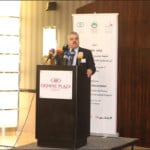
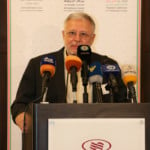
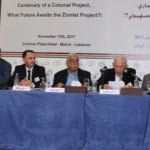
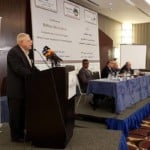
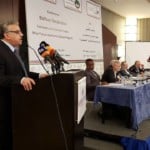
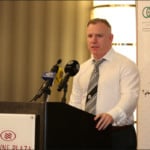
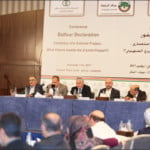
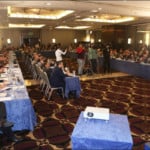
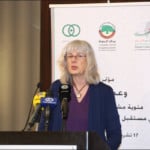
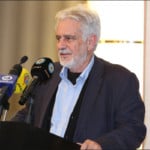
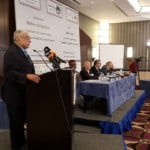
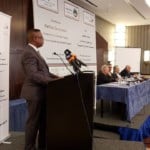
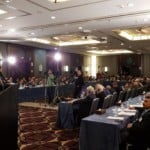
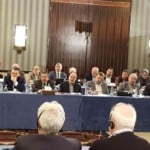
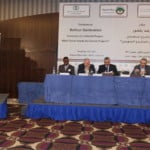

Leave A Comment